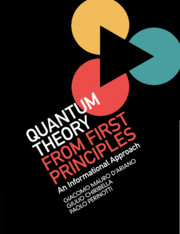Book contents
- Frontmatter
- Dedication
- Contents
- Preface
- Acknowledgments
- 1 Introduction
- Part I The Status Quo
- Part II The Informational Approach
- 3 The Framework
- 4 The New Principles
- 5 Causal Theories
- 6 Theories with Local Discriminability
- 7 The Purification Principle
- Part III Quantum InformationWithout Hilbert Spaces
- Part IV Quantum Theory from the Principles
- References
- Index
5 - Causal Theories
from Part II - The Informational Approach
Published online by Cambridge University Press: 09 February 2017
- Frontmatter
- Dedication
- Contents
- Preface
- Acknowledgments
- 1 Introduction
- Part I The Status Quo
- Part II The Informational Approach
- 3 The Framework
- 4 The New Principles
- 5 Causal Theories
- 6 Theories with Local Discriminability
- 7 The Purification Principle
- Part III Quantum InformationWithout Hilbert Spaces
- Part IV Quantum Theory from the Principles
- References
- Index
Summary
In this chapter we introduce the postulate of causality, and derive the mathematical structure of a causal OPT. We show how the present definition of causality is equivalent to the Einsteinian one, and argue that it is the only possible notion once it is stripped from its spurious deterministic connotation. In addition, the notion of causality used here is compliant with the historical philosophical concept since David Hume, and with the idea used in common reasoning, inference, and modeling in human sciences.
In brief, the present notion of causality can be stated as the requirement of no signaling from the future. This is also the only requisite for an OPT in order to satisfy the principle of no signaling without interaction. In mathematical terms in an OPT the causality postulate is equivalent to the uniqueness of the deterministic effect, which in turn is equivalent to the ability to normalize states. The notion of causality is so naturally embedded in our understanding of reality that it often remains unconsciously implicit in foundational research, even in recent axiomatizations.
Causality: From Cinderella to Principle
Causality has been the object of a very extensive literature encompassing hundreds of books and technical articles in a wide spectrum of disciplines, ranging from pure philosophy to economics, law, natural sciences, and obviously, physics. Also due to its involvement in such heterogeneous blend of disciplines, causality has long been a vexed notion. Perhaps the most natural connection between concepts of causality in different branches of knowledge is the one at the borderline between physics and philosophy, since the early work of Aristotle, up to the cornerstone of Renée Descartes, who broke the ground for the modern view of David Hume and Immanuel Kant, through to contemporary works on physical causation.
Causality has always remained in the realm of philosophy, staying only in the background of physics, without the status of a “law” or the rank of a “principle.” Most of the time causality creeps into physical theories in the form of ad hoc assumptions based on empirical evidences, as when we discard advanced potentials in electrodynamics or when we motivate the Kramers–Kronig relations. In other cases, causality is embodied in the “interpretation” of the theory, as for the Special Relativity of Einstein.
- Type
- Chapter
- Information
- Quantum Theory from First PrinciplesAn Informational Approach, pp. 139 - 156Publisher: Cambridge University PressPrint publication year: 2017



